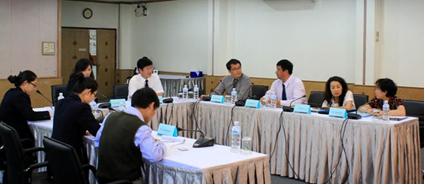Intellectual property (IP) refers to creations of the mind: inventions, literary works, artistic works, researches, names, images, and designs used in commerce. Usually, IP is used to protect and claim these works to the people who came up with them. However, many citizens do not use IP information platforms to advance their own innovations or update their enterprises technology.
Five officials from the Yunnan Intellectual Property Office (of PR China) have paid a visit to the Mekong Institute (MI) regarding new prospects for training partnerships with the Chinese Government, on the topic of Intellectual Property (IP) last Thursday, December 15, 2011.
The importance of IP has been heavily stressed by the West for many decades, however, for most Asian countries; the issue is considered new and hasnt been emphasized or as implemented much.
According to Mr. Youngzhong Xu, the Deputy Director General, they are currently researching on how the IP issue is being tackled in Thailand. They have found that last year, only 5,000 applications on IP have been issued. This is the same number as the province of Yunnan. China, he concluded, received 1.22 Million applications on IP last year alone.
Chinas Yunnan Intellectual Property Office had considered MI as its potential partner in conducting IP-related trainings and research due to MIs position as GMS-based. Partnership aspects are being proposed, and are ideally to include intellectual property protection, human resources, establishment of IP platform, and geographic indication. The aims of such trainings are to not only provide the Small and Medium-sized Enterprises (SMEs) with IP- related knowledge, but to share IP data among the neighboring countries in the region, allowing entrepreneurs to use technology that is available, or even yet, continue to improve the ones on the market, for them, in-turn, to patent their updates on these innovations.
It is hoped that once the implantation has taken place, people will possess knowledge and skill in IP management, IP creation, enforcement of IP rights, and utilization of IP.
During the discussion, they have showed their keen interest in working with MI, saying that they came here because of MIs fame in their province of Yunnan, in organizing and facilitating courses of relevance and impact.
Though the topic on IP is not in MIs thematic area and is quite new for MI, the issue is not to be disregarded, as it could be a useful tool for our SMEs in the region. There are many innovations out there, but many dont know about them and even less get to benefit from them.
Mr. Youngzhong Xu, the Deputy Director General of the Yunnan IP Office,
with Ms. Wang Jian, MI Program Facilitator, and Ms. Maria Medialdia, MI Rural Development Program Manager.








